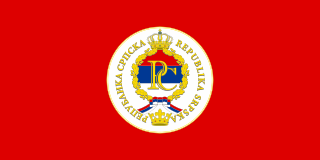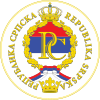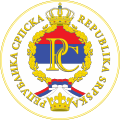The Politics of Bosnia and Herzegovina takes place in a framework of a parliamentary representative democracy, whereby executive power is exercised by the Council of Ministers of Bosnia and Herzegovina. Legislative power is vested in both the Council of Ministers and the Parliamentary Assembly of Bosnia and Herzegovina. Members of the Parliamentary Assembly are chosen according to a proportional representation system.
The political divisions of Bosnia and Herzegovina were created by the Dayton Agreement, which recognized a second tier of government in Bosnia and Herzegovina, comprising two entities: the Federation of Bosnia and Herzegovina (FBiH), with mostly Bosniaks and Croats, and the Republika Srpska (RS) with mostly Serbs – each governing roughly one half of the state's territory. The Federation of Bosnia and Herzegovina itself has a federal structure and consists of 10 autonomous cantons.

Dragan Čavić is a Bosnian politician of Serb ethnicity, who was the President of Republika Srpska in 2002–2006, after having been Vice President of Republika Srpska in 2000–2002.

Republika Srpska was a proto-state in Eastern Europe under the control of the Army of Republika Srpska during the Bosnian War. It claimed to be a sovereign state, though this claim was not recognized by the Bosnian government, the United Nations, or any other recognized state. For the first few months of its existence, it was known as the Serbian Republic of Bosnia and Herzegovina.

Milorad Dodik is a Bosnian Serb politician, current chairman and Serb member of the tripartite Presidency of Bosnia and Herzegovina. Previously, he had served as the president of Republika Srpska between 2010 and 2018, and as the 6th and 10th Prime Minister of Republika Srpska between 1998 and 2001, and between 2006 and 2010. In the 2018 election Dodik was elected as the Serb Member of the Presidency of Bosnia and Herzegovina, defeating one-term incumbent Mladen Ivanić. Some observers have described his rule as authoritarian or autocratic with strong nationalist position.
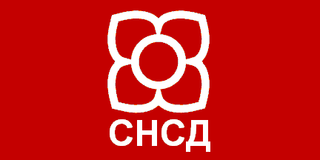
The Alliance of Independent Social Democrats, is a Serb political party in Bosnia and Herzegovina. Founded in 1996, it is the governing party in Republika Srpska, with its leader, Milorad Dodik, serving as the current Serb member of the presidency of Bosnia and Herzegovina.
This article is about the politics of the Republika Srpska, one of the two entities that together comprise the state of Bosnia and Herzegovina, the other being the Federation of Bosnia and Herzegovina.

General elections were held in Bosnia and Herzegovina on 1 October 2006. They decided the makeup of Bosnia and Herzegovina's presidency as well as federal, entity, and cantonal governments. As of September 2006 there were 2,736,886 registered voters. Of the 2.7 million voters, 1.7 millions are in the Federation of Bosnia and Herzegovina and 1 million in Republika Srpska. Official voter turnout as reported by the Central Election Commission was 52.74% of the total number of registered voters.
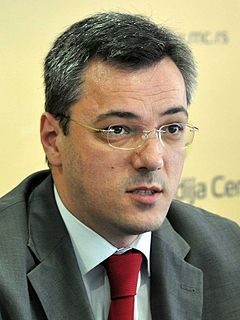
The presidential election of 2007 in the Republika Srpska entity of Bosnia and Herzegovina was announced after the premature death of President Milan Jelić on 30 September 2007 and was held on 9 December 2007. Until the election took place, Igor Radojičić, also from the ruling Alliance of Independent Social Democrats, was acting president. The election had to be called within fifteen days of Jelić's death; it was called on 11 October 2007, with candidates to be nominated by 16 October 2007.

General elections were held in Bosnia and Herzegovina on 3 October 2010 for both the Federal government and the two entities.

Ognjen Tadić, is a Bosnian Serb politician, lawyer, journalist and sociologist. He is MP in the Council of Peoples of Republika Srpska. He studied at the University of Banja Luka, where he earned a B.Sc. in the Faculty of Law and a M.sc. degree in the Faculty of Political Science. He is a lawyer and newsman. Tadić is married and has three children.

Željka Cvijanović née Grabovac, Грабовац; born 2 August 1967 in Teslić), is a Bosnian Serb politician, President of Republika Srpska for the Bosnian Serb SNSD party. She was Prime Minister of Republika Srpska from 12 March 2013 to 19 November 2018. On 7 October 2018 she is elected to be President of Republic of Srpska.
Several referendums have been held in Republika Srpska during its existence, whilst others have been proposed but not happened.

The Dayton Agreement ended the Bosnian War and created the federal republic of Bosnia and Herzegovina (BiH), made up of two entities, the Bosniak and Croat-inhabited Federation of Bosnia and Herzegovina (FBiH), and the Serb-inhabited Republika Srpska (RS). In the first years after the war, the Bosnian Serbs were viewed of as "anti-Dayton", however, since 2000, they are staunch supporters of the Dayton Agreement and preservation of RS. Bosniaks, overall, view RS as illegitimate and would see it abolished. There has been statements in RS regarding a theoretical future independence referendum from BiH in case of abolition. The 2006 Montenegrin independence referendum and Kosovo's declaration of independence in 2008 have raised the issue of RS's referendum and possibility of unification with Serbia. In 2015, RS government SNSD stated it would call an independence referendum in 2018 if RS's autonomy was not preserved, following a crisis in the country regarding judicial and police matters.

United Srpska is a political party based in Republika Srpska, Bosnia and Herzegovina. A Serbian nationalist party, United Srpska was formed in December 2015 following a split from the Serb Democratic Party (SDS).

